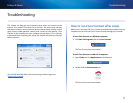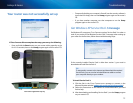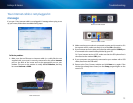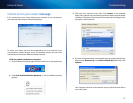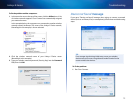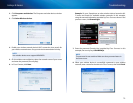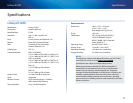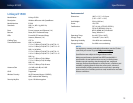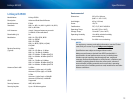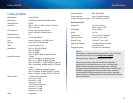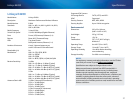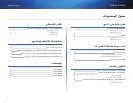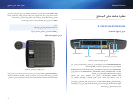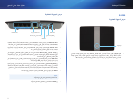
19
Specifications
Linksys E2500
Linksys E2500
Model Name Linksys E2500
Description Advanced Dual-Band N Router
Model Number E2500
Standards 802.11n, 802.11a, 802.11g, 802.11b, 802.3,
802.3u, 802.3ab
# of Antennas 4 total, 2 internal antennas per each
2.4 GHz & 5 GHz radio band
Detachable (y/n) No
Modulation 802.11b: CCK, QPSK, BPSK
802.11g: OFDM
802.11a: OFDM
802.11n: BPSK, QPSK, 16-QAM,
64-QAM
Receive Sensitivity 2.4 GHz
(Typical) 802.11b: -87 dBm @ 11 Mbps
802.11g: -70 dBm @ 54 Mbps
802.11n 20 MHz: -70 dBm @ MCS15
802.11n 40 MHz: -66 dBm @ MCS15
5 GHz
802.11a: -70 dBm @ 54 Mbps
802.11n 20 MHz: -66 dBm @ MCS23
802.11n 40 MHz: -62 dBm @ MCS23
Antenna Gain in dBi 2.4 GHz:
Antenna 1 (right rear): ≤2.94 dBi
Antenna 2 (front right): ≤3.78 dBi
5 GHz:
Antenna 1 (right front): ≤5.86 dBi
Antenna 2 (front left): ≤4.88 dBi
UPnP Supported
Security features WEP, WPA, WPA2
Security key bits Up to 128-bit encryption
Environmental
Dimensions 225 x 35 x 180 mm
(8.86” x 1.38” x 7.09”)
Unit Weight 452 g (15.94 oz)
Power 12V, 1A
Certifications FCC, IC, CE, Wi-Fi A/B/G/N
Operating Temp. 0 to 40°C (32 to 104°F)
Storage Temp. -20 to 60°C (-4 to 140°F)
Operating Humidity 10 to 80%, relative humidity,
non-condensing
Storage Humidity 5 to 90% non-condensing
NOTES
For regulatory, warranty, and safety information, see the CD that
came with your router or go to Linksys.com/support.
Specifications are subject to change without notice.
Maximum performance derived from IEEE Standard 802.11
specifications. Actual performance can vary, including lower
wireless network capacity, data throughput rate, range and
coverage. Performance depends on many factors, conditions and
variables, including distance from the access point, volume of
network traffic, building materials and construction, operating
system used, mix of wireless products used, interference and other
adverse conditions.



